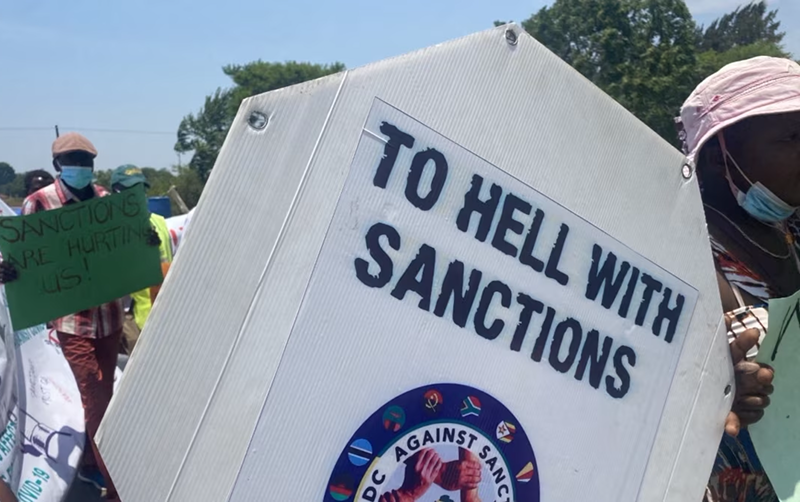- Politics
- No Comment
China, AU, SADC call for an end to Zimbabwe sanctions on Anti Sanctions Day

By Agencies
China, the African Union, and the Southern African Development Community (SADC) have supported Zimbabwe’s call for an end to sanctions, which they say have stifled the country’s, and the region’s, social-economic development.
“China supports Zimbabwe which holds the SADC’s rotating presidency and suffers from illegal sanctions in hosting the commemorative events of the fifth anniversary of the day,” China’s Ministry of Foreign Affairs said in a statement.
“This typical act of hegemonism severely undermines Zimbabwe’s national sovereignty, infringes on Zimbabwean people’s right to development, disrupts the efforts of Southern Africa to deepen cooperation and pursue common development, and harms international fairness and justice,” Beijing added in the statement.
During this year’s anti-Sanctions Day held in Bulawayo, President Mnangagwa led Zimbabweans in signing an online petition against sanctions.
The petition was then handed over the US Embassy in Harare.
“We have been here for 2,036 days, which means we have camped here for five years and six months. All we want is for the United States to lift the sanctions imposed on Zimbabwe,” one of the BAAS leaders said during this year’s Anti-Sanctions Day, according to local media.
“The Chairperson of the African Union Commission Moussa Faki Mahamat renews the African Union call for the immediate and unconditional lifting of all remaining sanctions imposed against the Republic of Zimbabwe, and in support of the Southern African Development Community (SADC) commemoration of SADC Anti-Sanctions Day,” the African Union Commission said in a statement.
Why it Matters
The United States and the European Union begun imposing sanctions on Harare in the early aughts, after Zimbabwe begun a series of radical land reforms driven by then President Robert Mugabe.
Then US President George W. Bush signed an executive order in March 2003 declaring a national emergency in Zimbabwe, and followed up with two more, in 2005 and 2008. Outgoing President Joe Biden rescinded these executive orders in March 2024, but immediately replaced with sanctions on 11 individuals and 3 entities.
President Mnangagwa, who was in the original 2003 and 2005 as a government official, was sanctioned under the new 2024 sanctions. His wife, the First Lady of Zimbabwe, was also sanctioned by the US Treasury. Others include the Vice President, Defence Minister, a Commissioner-General and a Deputy-Commissioner of ZRP, an intelligence chief, and the country’s Minister of State Security.
Despite the lifting of the sanctions program, the Zimbabwe Democracy and Economic Recovery Act (2001) is still in place in US laws. It, among other things, bans Harare from accessing loans from Bretton Woods institutions such as the World Bank and IMF, cutting Zimbabwe off from international financial structures.
To get the law repealed, Zimbabwe would have to foster democracy, hold free and fair elections, remove the military and police from politics, and compensate farmers who lost land in the land reforms. But the two-decade sanctions program has created a vicious cycle that makes achieving any of these goals possible.
For example, to skirt sanctions, Harare has been employing smuggling gangs to clandestinely sell gold, the country’s top export, a 2023 Al Jazeera investigation found. Selling gold through smugglers allows the country’s elite to acquire much needed foreign currency, and the clandestine nature of the trade means that they do not have to remit the money to government coffers.
Corruption, Sanctions, or a Cocktail?
Zimbabwe’s real GDP growth slowed from 6.1% in 2022 to 5.0% in 2023, and is expected to slow to just 2.0% in 2024 on account of reduced agricultural output and lower mineral prices in international markets, according to the African Development Group. Other than gold, the country also has commercial deposits of copper, iron ore, chromite, platinum, diamond, nickel, and other minerals.
The real losses of the two-decade long sanctions program are hard to quantify, but VP Chiwenga once estimated it to be more than $150bn by 2023. Among moderates in the country, corruption is an equal or bigger problem than sanctions.
A Transparency International assessment estimated that the country loses $2.5bn to corruption annually, which means it has lost more than $100bn in four decades of independence. Fixing this is among the conditions for the lifting of sanctions, but the current socio-economic conditions make it hard, if not impossible, to achieve.
